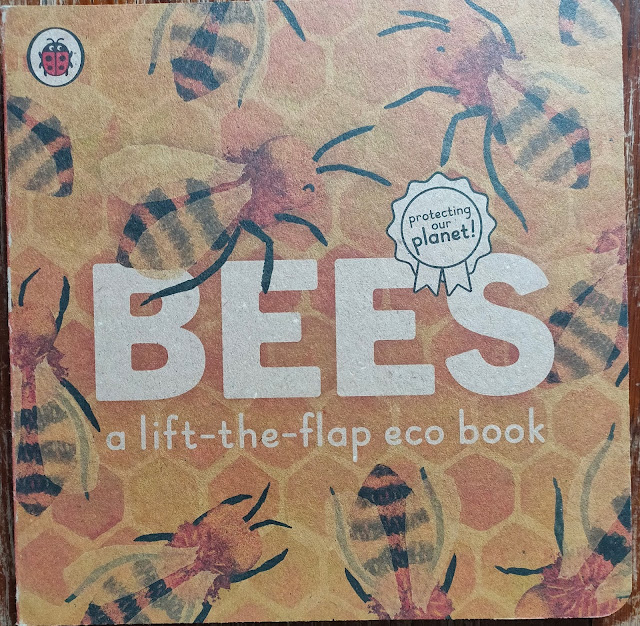Earth day is an annual event dedicated to awareness about the various environmental challenges that face our planet. Co-ordinated by the Earth Day Network, 193 countries around the world have their own version of celebrations. In many places, Earth Day forms part of Earth Week: a longer period of climate awareness that includes activities and campaigns. In 2021 Earth Day will be the 50th anniversary of the event.
So in our setting, where we work with children in the early years, we are sharing knowledge all week (from 19th April to 22nd April) - because as my old friend says - knowledge is power. And no matter how small, we can still share age appropriate knowledge about the planet, our role in protecting it, and why we should. So, each day we will focus on a different aspect of the planet, and talk to the children about what we can do to help and why.
Monday - our planet - please help Planet Earth (a ladybird eco book)
Tuesday - bees - Bees (a ladybird eco book)
Wednesday - seas - Seas (a ladybird eco book)
Thursday - Trees - Trees (a ladybird eco book)
Thanks to @PenguinRandomHouse we are able to share one of these brand new age appropriate board books every day this week.
They are printed on recycled board, using plant-based inks and glues with minimal plastic content. And they look beautiful too. The messages are simple, giving regard to the ages of the children they are aimed at, but adults can answer children’s questions and expand on the facts. I might suggest that the simple message is leaving out such a lot, like burning fossil fuels, or eating meat, or fishing, much more important things to consider than personal tasks like recycling bottles or using a bamboo toothbrush. But we have got to start somewhere, and any messaging about the state of the planet, oceans, forests, and biodiversity has got to be a good place to begin. The three lift-the-flap books - Bees, Trees and Seas go into more depth, explaining some of the problems we face and some things we can do to help, perfect presents on their own or as a set for every little person and their grown-ups to share. I have to say well done to Penguin Random House for tackling this in a toddler friendly way, so that parents have the opportunity to answer children’s questions, and to introduce some real life issues.
Please help Planet Earth - the perfect introduction for toddlers to help them understand and engage with the issue of climate change. It’s written from the perspective of the planet “I need your help”, and shows using clear and simple illustrations the problems we face from the orangutan’s forest disappearing to the polar bear’s ice melting. It also gives easy ideas for a place to start - walk instead of drive, turn off the tap when you brush your teeth, plant flowers for the bees or turn off the lights when you leave a room. If we can engage our littlest children in the big issues faced by us and the planet now, maybe we will have inspired them to find out more and act in a bigger way later on.
Trees - a lift the flap eco book - teaching children about the importance of trees to our planet, this book explains why we need trees (for oxygen, for homes for animals and birds, for wood to make things. It also shows us the parts of a tree, how they change through the seasons, some of the different types of trees. And we learn about deforestation and how bad it is for planet earth, and some things we can do to help.
Bees - a lift the flap eco book - teaching children all about the importance of bees, and how we can help to save them. We learn about pollination and how bees keep our planet healthy - “without bees we would eventually run out of many foods…”, a necessary message. We take a look inside a beehive and learn that a queen bee can lay about 2000 eggs a day! And we take a serious look at why bees are in danger - from increasing temperatures, mites, habitat destruction and toxic pesticides. But we can help by planting bee friendly gardens, and making a bee hotel.
Seas - a lift the flap eco book - teaching children all about the importance of the planet’s seas and oceans. We learn about why the sea is so important to the planet - the wildlife that it supports and the weather systems that it affects. We discover the big oceans and under the flaps find out who lives in them, different kinds of marine life and how the oceans are home to many different animals from corals to polar bears. We also learn how we have put our planet’s oceans in danger, by throwing away plastic and overfishing, and what we can do to help, including using less plastic, recycling it if we do use it, and choosing sustainable fish to eat (or no fish at all, but that’s just me)
Other books to share on earth day (some of my favourites)
Oliver Jeffers Here we are - notes for living on planet earth
Jo Readman and Ley Roberts - George saves the world by lunchtime
Peppa Pig - Recycling Fun
Emily Haworth-Booth - The Last Tree
Katie Cottle - The Green Giant
Katie Cottle - The Blue Giant
And loads more ideas here - https://www.huffingtonpost.co.uk/entry/childrens-books-environment_l_5d66f45de4b063c341fa409c
Blog | www.itsallaboutstories.blogspot.co.uk
Facebook | www.facebook.com/itsallaboutstories/
Pinterest | uk.pinterest.com/allaboutstories/






No comments:
Post a Comment